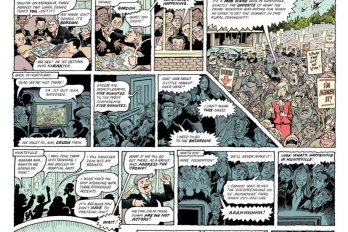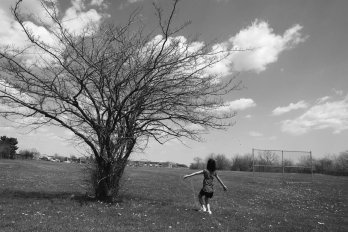Are you happy? Are you a teenager? These two questions might seem contradictory, even oxymoronic. For, as we all know, teenagers aren’t happy. They’re sullen, moody, impulsive, dramatic, pimply, gangly, and wracked with angst. They mope, wear black, write bad poetry, and doodle dark thoughts on their binders.
How do we explain, then, that when Statistics Canada set out to measure the happiness of Canadians, it found that teenagers (aged twelve to nineteen) are not only very happy but are, in fact, the happiest people in the country? It’s true. Every year since 2002, the Canadian Community Health Survey has asked Canadians to rank their life satisfaction, among other things, and every year teens overwhelmingly claim to be either satisfied or very satisfied with their lives. In 2008, the exact figure was a shocking 94 percent; 2009 results will be published this June.
As a former teenager myself, I have to ask: what is going on here? Personally, I don’t remember being happy at that age; I remember listening to the Smiths. I remember that, in John Hughes’s Breakfast Club taxonomy of teens, he called Anthony Michael Hall the Brain, which seemed like an act of mercy to me because it meant I didn’t have to self-identify with someone called the Dweeb. (Because, let’s face it, I was not the Athlete, the Criminal, or the Princess. Maybe the Basket Case, though she had terrible dandruff.) I remember various people back then, from my school guidance counsellor to Bryan Adams, trying to convince me that these were the best years of my life. And I remember thinking, “If that’s true, then I don’t have much to look forward to.”
What Doesn’t Kill You
The real value of social pain
Studies show that angst may be key to human survival. Social psychologists Geoff MacDonald and Mark Leary have found that emotional and physical pain are processed by the brain in the same way. Social exclusion (or the threat thereof) induces a physical pain response, including the release of pain-numbing chemicals—so it makes sense that over-the-counter painkillers can soothe hurt feelings, which MacDonald and Leary have found as well. But they urge you to pause before sprinting to the nearest drugstore; it turns out the capacity for social pain may be an essential aspect of our evolutionary heritage. Among social animals, individuals who form strong relationships are the most likely to survive in the wild, making insensitivity to social exclusion a genetic liability.
Not only was I an unhappy teen, but I’ve often retrospectively revelled in that unhappiness, treasuring it as a kind of emotional forge. To me, way back when, the teenage world was a tug-of-war between the Morrissey “sixteen, clumsy, and shy” types on one side and the Bryan Adams “18 ’Til I Die” types on the other. With their swaggering optimism, confounding confidence, and obediently well-styled hair, the latter clearly weren’t to be trusted. So it’s with some dismay that I discover that, apparently, 9.4 out of every ten Canadian teenagers are people who, in high school, I would have considered the enemy.
On closer analysis, the statistics make more sense. For starters, Canadians as a whole are exceptionally satisfied (with a life satisfaction rate of 91 percent, as of 2009). Also, StatsCan argues that the two factors most likely to erode life satisfaction are health issues, and life stress, i.e., “managing multiple roles associated with career and family responsibilities.” These are two areas, not coincidentally, that teens aren’t particularly worried about. Teens may be likely to have a million little stresses (OMG I can’t BELIEVE that just HAPPENED txt me back!!) but neither of the two really big ones.
Even so, it’s pretty clear that the best-years-of-your-lifers are winning the tug-of-war. Perhaps it’s fitting that Hughes, the patron saint of teenage melodrama, died last year. A phenomenon like Twilight suggests that there’s still a market for tales of brooding boys and heartsick girls, but it also reinforces the fact that teens themselves have become a formidable market. What’s to be glum about when the entire entertainment industry is falling over itself to service your desires?
Not to mention that as a teen today you’re part of the first generation in human history that’s more adept with technology than its elders are. (I can’t imagine that 200 years ago there were many fifteen-year-olds explaining to their dads how to work a plow.) Today’s parents, for their part, tend to be much more capable, or at least more fun, caregivers than the generation of parents who came before them. If all of that helps alleviate some clichéd teenage misery, who am I to stand in opposition?
Yet looking over this wasteland of teenage happiness, I’d like to say a word in favour of old-fashioned angst. Just as the child is the father of the man, I’d argue that the teen is the father (or the mother) of the grown-up and that the process of becoming a grown-up should involve at least a little, you know, growth. Which in turn should probably involve some unhappiness. As an adult, I ascertained pretty quickly that I could never truly be friends with anyone who claimed to love and miss their high school years, because it reliably meant that, on some level, he or she was still stuck there. It’s no doubt fun, and perhaps even healthy, to want to be eighteen till you die when you’re, say, eighteen. It’s another thing to be that same guy at forty, no matter how satisfied (or very satisfied) he imagines himself to be.
This appeared in the June 2010 issue.




